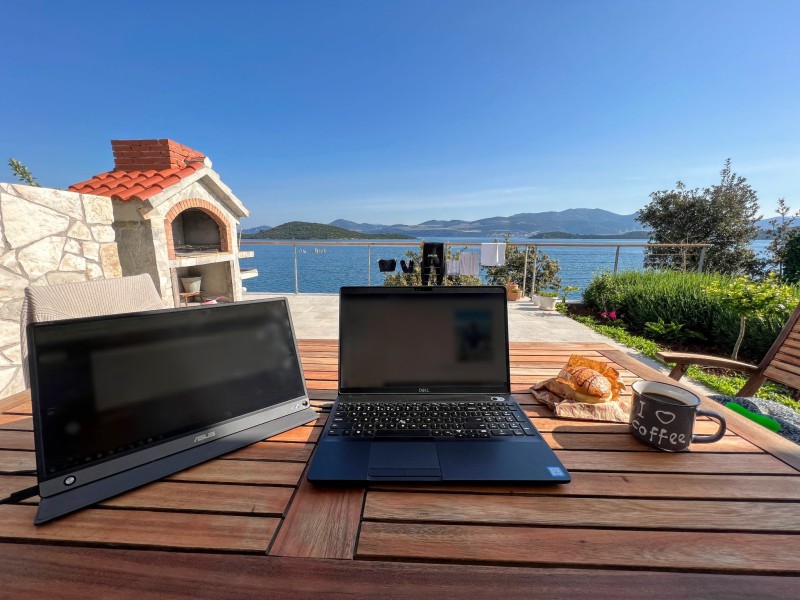5 tips for your first Digital Nomad experience
 Krzysztof Przekwas
Krzysztof Przekwas
Since I discovered the joy of working remotely from places other than my living room digital nomading become an important part of my work life. I had the opportunity to visit (and work from) various remote places in Poland and abroad in the past two years. At the time of writing this article, I'm temporarily based in Croatia. During this time, I got dozens of questions from my friends about my impressions. Many of you have asked for organizational details or advice on how to deal with the challenges of this type of work. The summer season is approaching, so I will describe my top 5 tips for stress-free workation. Those may be highly subjective, as I'm basing those on my own experiences. The relevance of each tip may vary depending on the length of trip, destination, type of work you do or your experience. Yet, without further ado, liftoff 🚀
1. Start with your vacation
One of the ideas of digital nomading is to combine the work duties with daily living irrelevant to the location. That's a brilliant idea, but we humans are still emotional creatures. On arrival, you'll be hyped up about the trip you just started, excited about the apartment you rented and have the hots to explore the surroundings. This is not a perfect mindset to strap yourself right back to a desk. My suggestion is to give yourself 2-3 days of rest right at the beginning. This approach lets you regain your strengths after the trip, check the environment, Wi-Fi, shops nearby, available transportation and, most important for me, calm yourself down resulting in top-notch performance when you pick up your work back again. (And a handful of stories ready to share with your colleagues!)
2. Don't neglect the workspace
Let's do a quick experiment. Go to Google, search for pictures and look for the phrase Digital Nomading. Marketing-wise we often consider workations to look a bit like this:
When working from the office or home we strive for comfort and it shouldn't be anyhow different in the case of digital nomads. When searching for an apartment make sure that there's a dedicated workspace. A countertop, a barstool or a dressing table is not a dedicated workspace! Of course, every once in a while you can sustain a bit of in-bed Excel & Outlook, but stretch that to a few weeks and back pains will effectively remind you why a good office chair costs that much.
Also if you're planning to work from cafes and coworking places, double-check if that's your cup of tea. Venture into your current city and try to work from the local cafe at least a couple of times. It will give you a great sense of what sort of environment it is, how such a visit differed from a casual Wednesday coffee trip and give you a feel about key important aspects of a spot to be considered work-suited 👷♂️
3. Laptop, charger, headphones and ... ?
Remote work is so easy these days! All you need is a laptop and Wi-FI!
Yeah, it can be like that, but that's rather a unicorn scenario. When working from home, where all your belongings are within the reach of your hand you may not notice how much stuff you use on a daily basis. Not all of them may be indispensable and digital nomads are often more minimalistic, yet working shouldn't feel like a trip back to the Stone Age. Arm yourself with a
My non-obvious, experience-learnt suggestions would be:
Secondary monitor 📺 - By far the most asked-about commodity. For my type of work, it is a must. It is a bit of a hassle to get a casual office monitor abroad. For me, the game-changing moment was the discovery of portable, foldable monitors. I went for Asus ZenScreen (non sponsored) and I couldn't be happier ever since.
Noise-cancelling headphones 🎧 - It's one of the best investments I made to my remote work toolkit. Working from cafes, coworks, trains & busses was always very distracting for me from the amount of background noise present. The ability to make it go at a push of a button is a tremendous relief for me. Also, most ANC headphones should have a quite good noise-cancelling microphone which will improve your coworkers' experience, but do your research!
Powerbank ⚡ - Seems obvious, but I had to learn it the hard way. With more & more laptops having USB C charging ports and power bank prices coming down it's a great opportunity to buy some backup power source that will let you do a few working hours off the grid. For charging laptop+phone as a hotspot, my recommendation is to go for something with a capacity over 20Ah. You may want to double-check the power output as well if your laptop is very power-hungry and don't cheap out on some no-name brands!
4. Always have a plan B
Being a digital nomad often is a synonym for becoming a pure disaster magnet 🧲. A very powerful one. I'm sure you'll do your best to select the perfect flat to rent or check the internet connection with the owner, but I can promise that some funky situations will chase you down. The most common stories I have heard on corridors of coworking spaces (and experienced, unfortunately) are power outages, internet malfunctions and hardware breakdowns. You won't avoid issues like that, but you can do your homework and come in ready to challenge them. No electricity? I've checked there's a cafe and McDonald's two blocks away, I can work from there today. If the internet can't stand up to the important meeting I do have in the afternoon I'll just switch to the mobile hotspot I bought back home with a local data plan so I won't go broke mid-call. If any particular part of your daily routine raises your concerns try to think of any alternative how you could get around that in a new, remote environment.
5. Check the local community
Working hundreds or even thousands of kilometers from your (and your company's) hometown can give you a slight sense of unrest and anxiety. One of the common causes of that is the feeling of loneliness. The solitude as an employee and as a normal person that you are outside business hours. Being a digital nomad gives you the ability to not only enjoy places that you're visiting, but also the communities.
Coworking places are a good starting point. My tip as well would be to leverage social media. For example, you can search Facebook for groups named like Digital Nomad <location> (Lisbon example). You can find numerous tips & tricks from fellow travellers and locals. Amond more popular destinations you can try to find more organized communities which often focus on arranging dedicated events bridging the locals with nomads & expats (Split example).
Here you have it!
That's it! My quick 5 tips to improve your first digital nomading experience. I keep my fingers crossed for you and your upcoming adventures ✌ Don't forget to share your discoveries as well!
Subscribe to my newsletter
Read articles from Krzysztof Przekwas directly inside your inbox. Subscribe to the newsletter, and don't miss out.
Written by


